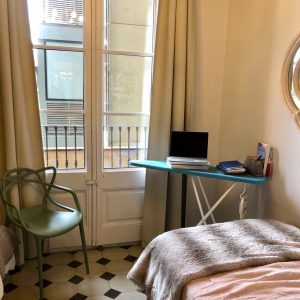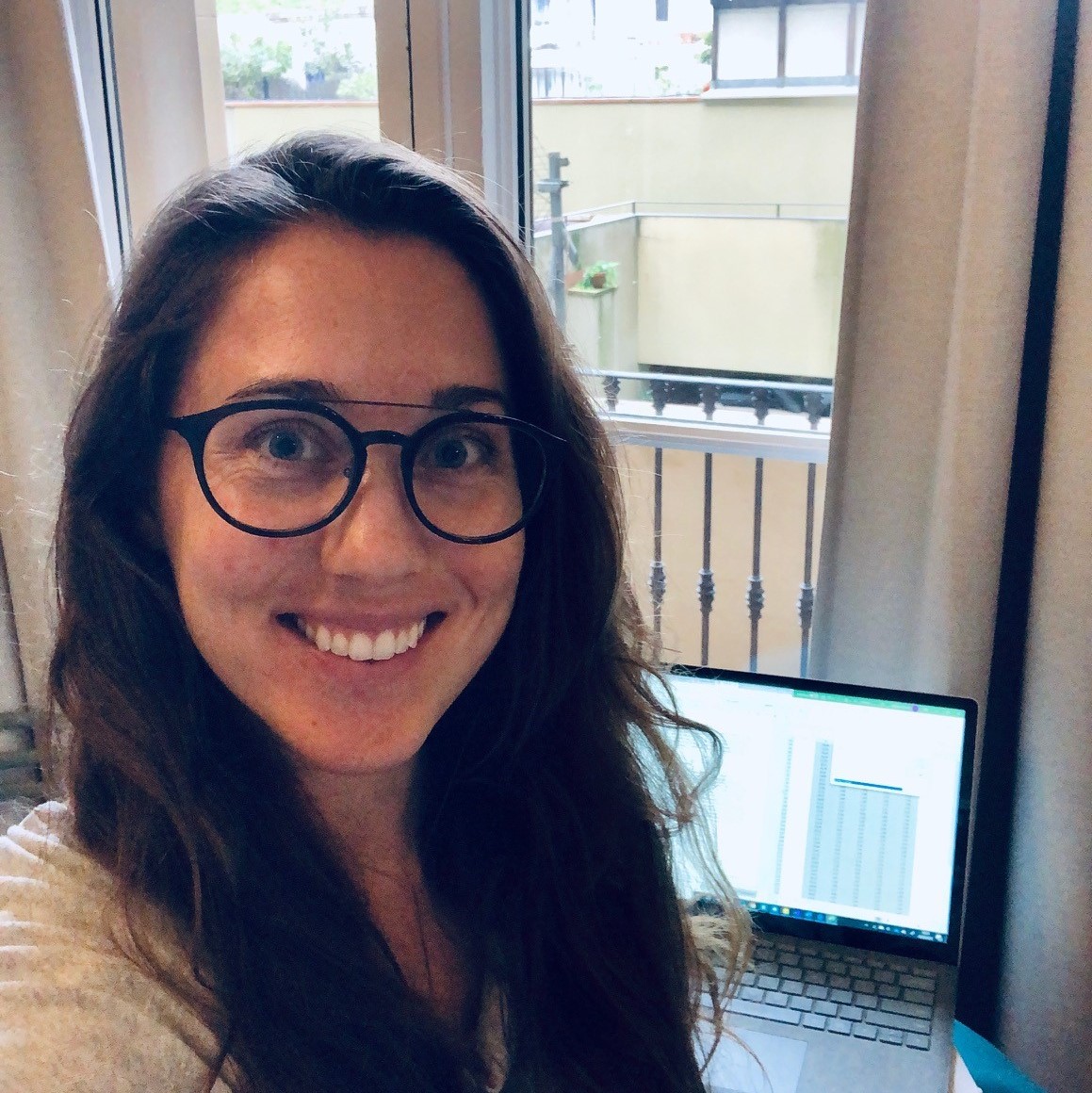Kaitlynn Brown, MBA Class of 2021 is from Traverse City, Michigan. After earning her Bachelors in Finance from Michigan State University, she moved to Washington, DC, where she worked for eight years in government contracting. She’ll be interning in London this summer with Citibank as a financial management associate.
Her plans for the first day out of lockdown include running to the beach, and perhaps directly into the Mediterranean, and slowly walking and eating her way back home.
A natural reaction to quarantine, or “lockdown,” is to think of all the things you can’t do or of all the time lost. You begin to feel as if you’ve lost all sense of control.
There’s seemingly no transparency at any level nor is an outcome known, so you look for something, anything to hitch your hopes to. And that, I would argue, is Yourself. The one person you can depend on is you, and what you can control is what is happening now, at this moment, in front of you.
For me, a daily ritual is key, and that starts with coffee. Good coffee is a necessity in our flat. French press with freshly ground beans is our standard. On mornings I typically have Greek yogurt with fresh berries and a banana, all topped with granola. There’s no denying I’m a creature of habit. It’s also my way of gaining control of an uncontrollable situation.
It’s something I had to learn before coming to IESE and has served me well these last 45 (and growing) days. On day two or three of the lockdown, I created a daily to-do list. No matter how small the task, it went on the list. I then began referencing that list until the items on it became habit.
I have found it interesting to learn how others manage anxiety. Some people ingest as much information and news as they possibly can. The more news consumed, the more in-control they feel. For me, the more news I read, the more uncertainty I feel, leaving me with more questions and less clarity than before.
I need to limit my daily news intake to two or three short podcasts and one or two articles. Other friends have taken up coding classes, learning Arabic, brainstorming entrepreneurial adventures. Others look to the past and reminisce about travel adventures or resume old hobbies that before the MBA consumed their schedules. And some seek companionship in budding relationships. None of these outlets are wrong–there just isn’t a one-size-fits-all approach.
Perhaps the hardest part is accepting that what others are doing to cope may not work for you, and not giving up, but continue to find what does work. However, this takes time. Thankfully, time is precisely what we have. Rather than having the mentality that time is wasting away or that we’re losing time, think of all the ways we’re gaining it. It may be a bit unconventional, but if quarantine has a gift to give, it is time!
For me this time has meant:
Time to cook
One of the best aspects of IESE is the diversity of its student body. This is something my flat-mates and I have been able to enjoy through cooking. Dinners and baking have become a way for the four of us to get to know each other, whether through the diverse meals or the conversations had while consuming our creations! We’ve made sure to rotate cooking duties. Not only is it far more enjoyable to cook for other people, it’s also incredibly nice to have someone cook for you. We’re compiling our American, French, Indian, and Mexican dishes for a potential Quarantine Cookbook. Stay tuned!

Working hard in the kitchen…

…and finally, the finished product!
Time to Work Out
I immediately committed to a daily workout. At first, I used a routine I had created when I was traveling. But with the world being at home, it has been amazing to tap into classes I miss from home in the United States. I’ve taken hip-hop and salsa classes in my living room and bedroom, and even convinced my housemates to join. I’m sure our neighbors have appreciated the entertainment…
I swallowed my pride and attempted “push-up challenges” on social media and relaxed through yoga classes. I have also joined around 50 of my classmates and committed to a 60-day workout challenge. The videos are old and not nearly as flashy as the “live” videos streaming on Instagram, but the routine has created yet another IESE community. Us group members check-in with each other daily and we continue to motivate one another. Staying active has been integral in keeping me physically healthy, but more importantly, mentally healthy.
Time to create, to read, to reflect
I’ve started writing and reflecting on the last eight months; term one and two were jam-packed with coursework, summer internship recruiting and navigating a new city. Student life has been nothing short of eventful. It has been a shock to my system not running at 1000 km/hour every day. But slowing down, remembering all the wonderful and not-so- wonderful moments of the last eight months has been helpful as I look forward to what’s next.
One of the first Amazon orders we made was for a puzzle, art supplies, and books. My housemates will draw or paint, and we all play trivia in the evenings with other classmates. And some days I choose to escape reality entirely, either through puzzling or reading. I have escaped to the shores of North Carolina while reading Delia Owen’s “Where the Crawdads Sing,” teetered on the line of fantasy and reality in Chloe Benjamin’s “The Immortalists,” and gotten lost in Rupi Kaur’s words in “Milk and Honey.”
Time to call
I remember saying my goodbyes last summer and promising family and friends that the time difference would not matter: “I promise I will call”, “call me anytime”, or “you’ll never know I’m actually on the other side of the Atlantic”, “just a phone call away!”
Well, the reality is, I miscalculated in making those promises. Managing the MBA schedule, both academic and social, took up every minute of my day. And any spare minutes were spent collapsed on my bed. You must make time for life outside the MBA bubble, and I will be the first to confess that that has been a weakness of mine.
Quarantine has given me the time and headspace to call home. Sometimes it makes me sad to realize how much has happened that my family and friends still don’t know. But then I realize how fun it is to remember and proudly share my accomplishments—and laugh at my failures—with my friends and family.
Time to sleep
First term, I was averaging 5 hours of sleep. Second term, I was averaging almost 7. The first few weeks of quarantine, I was catching up on sleep. Now, I find it extremely difficult to fall asleep, and then even harder to wake up. I set an alarm; otherwise, I would sleep the day away. This is a new challenge for me. Sleeping well is something I’ve always taken for granted. I’ve tried tea, reading, watching Netflix, not watching Netflix, lavender oil, ocean wave “music”. Sometimes a combo works and other times I toss and turn until 2AM, at which point (hopefully) my brain finally turns off.
Time to Learn…Virtually
It’s tough. Really tough. Rebuilding the confidence to speak “in class.” It’s like returning to day 1 in the classroom all over again. Virtual classes and participation are only part of the challenge, as team dynamics have changed. There’s a new level of stress and stress management that wasn’t there before. Students have family or friends, or friends of friends that are sick. They can’t go home or did go back home and are now quarantined. In some cases, they’re in absolute isolation. No matter how strong of a communicator you are, these added stressors are massive, dynamic, and changing by the hour.
It was my flat-mate who gave me a reality check when I was feeling defeated. I felt like I was unable to communicate with my team, and even worse I felt like a weak link. She reminded me (from the countless mock interview stories we’ve shared), that for the last five years of my career in the US, my bosses were remote to me. I was (I think) pretty good at working “virtually”. But this is a different animal. Team dynamics are different. Priorities, and decision-making authority are different.

My work desk at home
Final Thoughts
I was reading a Harvard Business Review article on the emotional toll quarantines are taking on society and the parallels to grieving. Grief is not foreign to me. It’s something I carry with me daily. In fact, what we’re all experiencing at some level or another is grief. For me, it’s that familiar weight of the unknown and the uncertainty that begins to take over every part of my body. The HBR article, like most grief literature, talks about five stages, how there’s no right recipe for how long one spends in a stage or how many times you go back to certain stages. Because the reality is grief, once assumed, never leaves. You will learn however, how to manage it.
We’ve all weathered storms before, and we will do it again. For me, that means sometimes slugging through my 40-minute workout; I have made a commitment, I can’t let myself down. Other times that means staying in bed and allowing myself to watch Netflix on repeat. Or, walking into my living room and letting my housemates cook me dinner. I now look at my to-do list only once a week. Sometimes I create new ones for a specific day, but it has become a reference as the items have become routine. These lists help me stay in the present, give me structure for achievable goals, and prevent my mind from going into hyperdrive.
There’s no getting around the fact that quarantine really does *insert your preferred word*. But stay strong. Try to stay in the present, focus on what is directly in front of you. Enjoy the newfound time for indoor activities, get creative, and connect with the people with whom you’ve lost touch. Use the time to regroup and reset.
Allow yourself time to reflect and even to get lost in alternate realities. And accept that not every day will be the best day, nor will every day be the worst, but that most importantly: this time in our lives is temporary. Let’s not waste it.
Thank you Kaitlynn for your honest sharing and positivity!
Pursue your dream MBA! Take these next steps today:







